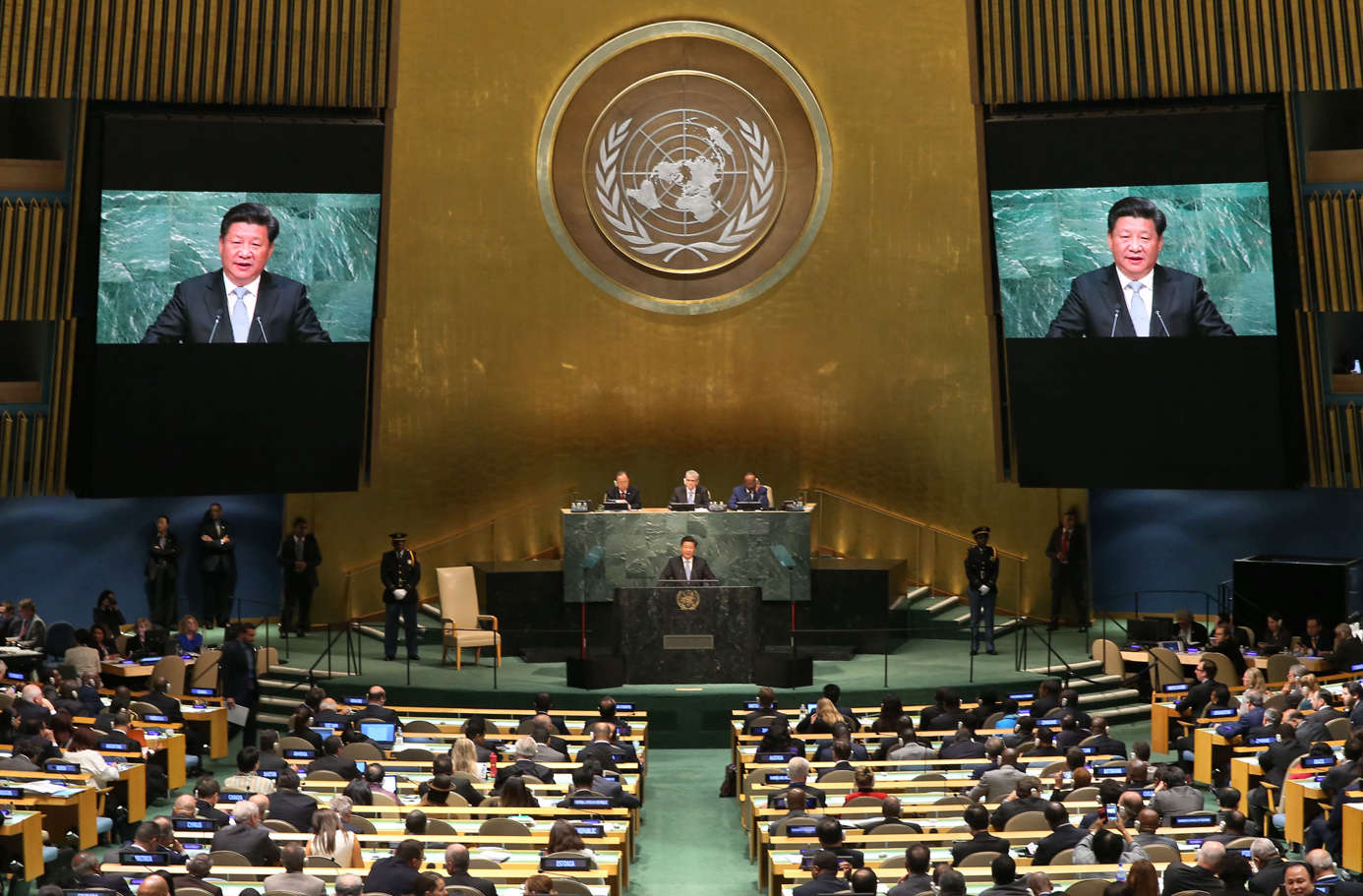Scholars: UN still crucial to int'l order

China's President Xi Jinping delivers a speech “Working Together to Forge a New Partnership of Win-win Cooperation and Create a Community of Shared Future for Mankind” at the General Debate of the 70th session of the UN General Assembly in New York on Sept. 28.
On Sept. 28, Chinese President Xi Jinping addressed the General Debate of the 70th session of the United Nations General Assembly at UN headquarters in New York.
In his speech titled, “Working Together to Forge a New Partnership of Win-Win Cooperation and Create a Community of Shared Future for Mankind,” Xi said the UN has withstood the test of time over the past seven decades as all countries work to uphold peace, build a homeland and pursue cooperation.
Having reached a new historical starting point, the UN needs to address the crucial issue of how to better promote world peace and development in the 21st century, Xi said.
Post-2015 agenda
Some scholars said the signing of the UN Charter 70 years ago laid a solid foundation for the modern international order and set up basic principles for contemporary international relations. Now, the UN is still the cornerstone of the international order, they said.
“The 70th anniversary of the UN provides the right occasion for reflecting on the international order,” said Jia Qingguo, dean of the School of International Studies at Peking University, adding that the order after World War II is constantly changing. On the whole, the number of nations around the world has increased, and the demands of developing nations have received attention, he said, but there is still the possibility of human annihilation, small-scale conflicts still occur, obstacles to combating global challenges remain, and common prosperity has yet to be realized.
Therefore, it is still an important mission for the UN to improve the current international order and promote world peace and development. The UN Sustainable Development Summit adopted a post-2015 development agenda that charts a roadmap for global development over the next 15 years.
Building on the Millennium Development Goals and aiming to complete what was not achieved, the agenda includes 17 Sustainable Development Goals and 169 targets covering various fields, such as poverty and hunger alleviation, health care, education, gender equality, water and environmental conservation, energy, and climate change.
South-South cooperation
President Xi announced an assistance fund to support the South-South cooperation. He said China will also do its best to raise its investment in the least-developed countries. In addition, China will forgive the debt of the outstanding intergovernmental interest-free loans due by the end of 2015 owed by the relevant least-developed countries, and landlocked and small island developing countries, he said.
Some scholars said these measures have been well received, and China has set an example in implementing the post-2015 development agenda.
“As the second-largest economy and the largest developing country, China functions as a bridge between developed and developing nations in global governance,” said Wang Yiwei, a professor from the School of International Studies at Renmin University of China.” And China always adheres to the principle of mutual benefit and the correct viewpoint of righteousness and benefit, he added.
“China does have a say and discourse power on development issues, and the Chinese government has been consistently giving support to development in other developing nations,” said Su Changhe, a professor from the School of International Studies and Public Affairs at Fudan University.
Development is still at the top of the agenda, he said. “Since the People’s Republic of China was established more than 60 years ago, it has gained good development experience, greatly improved the livelihood of the Chinese people and even people of the whole world, and contributed human and financial resources as well as ideas and knowledge to global governance.”
Community of shared destiny
Xi pointed out that peace, development, equity, justice, democracy and freedom are values common to all mankind and reflect the lofty goals of the UN. “Yet these goals are far from being achieved, and we must continue our endeavors to meet them,” he said.
“In today’s world, all countries are interdependent and share a common future. We should renew our commitment to the purposes and principles of the UN Charter, build a new type of international relations featuring win-win cooperation, and create a community of shared future for mankind,” Xi said.
The UN has played a large role in maintaining world peace and security, promoting global prosperity and development, and solving international conflicts and disputes. However, the changing international situation has imposed new challenges on the UN.
Su identified the three main problems: The UN should promote cooperation among major countries and oppose unilateralism. It should maintain the established system of state sovereignty and condemn any attempt at subversion or separation. Finally, its relations with various regional international organizations should be well handled.
Pang Zhongying, dean of the School of Global Studies at Sun Yat-sen University, said China’s rapid growth in economy and comprehensive national strength since the reform and opening up can be attributed to its effort to join and improve the global governance system. “The existing system needs reform but only little progress has been made in this respect,” he said. “And it is an arduous task for China to fulfill its role as a participator, reformer, coordinator and designer.”
Zhang Junrong is a reporter at the Chinese Social Sciences Today.
